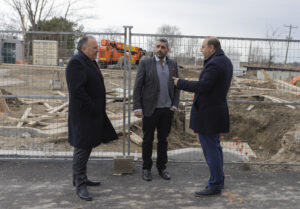Originally posted on May 5 2021.
As I shared with those Londoners who considered my candidacy for Mayor nearly three years ago, I have a passion to serve our community. I am at a place in my life where I believe my skills and operating experience can be of significant benefit to our provincial government as it begins to turn its attention towards rebuilding our economy and restoring the public services our citizens should expect and deserve.
I am also motivated by the many challenges before us:
- large segments of our economy including many small businesses and our hospitality sector, that are still reeling from the pandemic,
- increasing disparity between wealthy households and those just getting by,
- a city that is finding itself increasingly isolated and less relevant on the national stage,
- neighbourhoods feeling less safe,
- a downtown struggling to restore its vitality,
- young people seeking the means to fulfill their dreams.
Perhaps the biggest motivation for me is best reflected in the words of Robert Francis Kennedy, the politician I most admired as a youth and the one who inspired me to seek public office.
Kennedy’s personal style really resonated with me. He was confident, intelligent, charismatic, and a brilliant orator. Yet he also exhibited an ease and humility about him, especially around people struggling to make ends meet. He did not apologize for his privilege. He leveraged it to help others. He demonstrated empathy when needed, and firmness when required. Above all he expressed himself in a manner that inspired you, that empowered you, that made you feel like you mattered and can make a difference if you are willing to step up.
In my opinion, Kennedy’s most inspirational words came in April 1966 during his tour in South Africa, where, at the height of apartheid, he was invited to speak to a gathering of students at the University of Cape Town. The speech became known as the Ripple of Hope and in it, Kennedy said:
“Each time a man stands up for an ideal, or acts to improve the lot of others, or strikes out against injustice, he sends forth a tiny ripple of hope, and crossing each other from a million different centers of energy and daring those ripples build a current which can sweep down the mightiest walls of oppression and resistance.”
It is that Ripple of Hope that drives my passion for office. A passion to represent those Londoners whose voices are not heard or well-represented – workers, retirees, young families, small business owners, taxpayers – who toil every day without complaint, who support not more government intrusion but enablement, who seek not more public funding or “free programs”; just a fair shake at realizing their dreams.
Our city, our province and our country have a unique opportunity to emerge from the pandemic stronger and more vibrant than ever. We have an opportunity to join with other leaders throughout the region to create real and lasting change in our community – in our economy, in our classrooms, in our hospitals, in our neighbourhoods.
I would like to be your agent of change, your voice at Queen’s Park, and your representative at the government table. I have the skills, experience and above all the passion to make a noticeable difference in how London is perceived and received on the national and international stage.
Above all, I welcome the opportunity to serve, to send forth that Ripple of Hope and with grace, make a difference in the lives of our community, our province and our nation.
I welcome your support.

